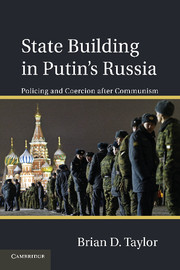Book contents
- Frontmatter
- Contents
- List of Figures, Tables, and Maps
- List of Abbreviations
- Acknowledgments
- Note on Transliteration and Translation
- Introduction
- 1 Bringing the Gun Back In
- 2 The Power Ministries and the Siloviki
- 3 Coercion and Capacity
- 4 Coercion and Capacity
- 5 Coercion and Quality
- 6 Coercion and Quality
- 7 Coercion in the North Caucasus
- 8 State Capacity and Quality Reconsidered
- Appendix A Publication Abbreviations
- Appendix B Interview Index
- References
- Index
- References
5 - Coercion and Quality
Power Ministry Practices and Personnel
Published online by Cambridge University Press: 04 February 2011
- Frontmatter
- Contents
- List of Figures, Tables, and Maps
- List of Abbreviations
- Acknowledgments
- Note on Transliteration and Translation
- Introduction
- 1 Bringing the Gun Back In
- 2 The Power Ministries and the Siloviki
- 3 Coercion and Capacity
- 4 Coercion and Capacity
- 5 Coercion and Quality
- 6 Coercion and Quality
- 7 Coercion in the North Caucasus
- 8 State Capacity and Quality Reconsidered
- Appendix A Publication Abbreviations
- Appendix B Interview Index
- References
- Index
- References
Summary
The state, including its law enforcement and security services, is there to work for the people, to defend their rights, interests and property, not to mention their security and their lives.
Vladimir Putin, 2004Do Russian law enforcement and security services work for the people and defend their rights? On the eve of his second term, Putin put his finger on what is central to thinking about not just the capacity, but the quality, of state coercive organs. In a civil state with high state quality, the state's monopoly of force is wielded not primarily for the interests of the ruler(s), but for society as a whole.
In the previous two chapters, we focused on the capacity of the Russian power ministries. At the national level, there is some evidence that the capacity of the power ministries increased during Putin's presidency. Violent clashes for sovereign power in the capital were off the table, the fiscal capacity of the state increased, and toward the end of Putin's tenure, there seemed to be some improvement in fighting violent crime and terrorism, although Russia continued to lag comparatively in these areas. The greatest increase in coercive capacity, however, came in the rebuilding of a “regime of repression” that the Kremlin used to help fix elections and repress economic and political rivals. Moreover, private property rights remained insecure, both for oligarchs and for ordinary businesspeople and citizens, as we will see in this chapter.
- Type
- Chapter
- Information
- State Building in Putin’s RussiaPolicing and Coercion after Communism, pp. 156 - 203Publisher: Cambridge University PressPrint publication year: 2011



